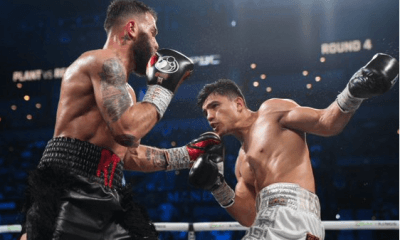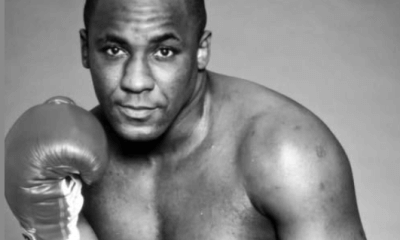Articles of 2006
The life and times of King Kong
Nicknamed King Kong because of his size and strength, former heavyweight boxer Ezekiel Dlamini, like his fictional namesake, led a dramatic life and tragic end… one also connected to the perceived betrayal of a woman he loved.
Born in Vryheid in Natal, South Africa in 1921, Dlamini received some schooling in a Catholic mission before leaving home at the age of 14 to make a life of his own, away from his father’s whip in the family fields. He worked as a gardener for a time in Durban, but after traveling to Johannesburg as a member of a touring soccer team, decided to stay in the city of gold. The world was of course completely different in those times, the credo of live fast, die young and leave a good-looking corpse was the dictum of many young black men and women of the day.
Gangsters, jazzmen, beauty queens, folk heroes and illegal dagga (marijuana) dens were the lifestyle of many. It was in these times that some of South Africa’s most noted black musicians like Hugh Masakela, singers like Miriam Makeba, and writers like Can Themba and Henry Nxumalo rose to prominence. “The Americans,” “The Spoilers” and “The Msomis” were some of the gangs who copied their style and image from what they saw in American movies. It was a boiling pot of cultural confusion mixed with a legendary energy and creativity on a backdrop of crime, murder and political oppression. Some say it was a terrible time, others say it was magical. It all depends which side of the knife or the spotlight you were standing.
Dlamini made his living as a professional gambler and with plenty of free time on his hands would make his way around training gyms, dance and singing halls. The legend goes that the first time he walked into a boxing gym and saw people fighting with “cushions” around their fists he laughed himself sick. Mocking the boxers he’s reported to have said he could beat all of them up one after the other including their boss (trainer), who happened to be a former professional and local boxing legend by the name of William “Baby Batter” Mbatha.
Mbatha laughed him off, but as Dlamini became more and more insulting, Mbatha decided to teach him a lesson. He handed the youngster a pair of gloves, laced his own up and went about giving him a sound beating and knocking him to the floor. The boxing bug bit and Dlamini was eager to learn more. He impressed onlookers with his strength and was named “King Kong” by Fred Thabedi, then president of the Non-European Amateur Boxing Association.
Another legendary story about King Kong after he turned professional is that on finding out another boxer was saying that he could beat him, Kong jumped on a train rode 600 km to Durban and confronted the man at his workplace at the railway station. The boxer, a light heavyweight by the name of Sam Langford, was highly distressed by the situation and said fights must be arranged by managers and promoters; you don’t just rock up and fight wherever. Kong responded; “You said you’d fight me anywhere, any time in the week and twice on a weekend, so let’s do it.” A friend of Langford’s intervened and spoke sense into Kong’s head. The big man walked away thinking Langford was a coward.
Langford most certainly must have been named after the legendary black American boxer who gave Jack Johnson a torrid time in the ring and who many believe could have won the world title had he been given the opportunity. Kong also defeated another boxer by the name of John Sullivan to win the (Non-European) Transvaal heavyweight title in 1951. It was a huge affair and the BMSC hall was packed to the rafters. Known for his incredible stamina, King chased Sullivan around and peppered him with blows from all angles. King would stand ala Muhammad Ali with his hands raised or rubbing his stomach while Sullivan feebly threw punches to his abdomen. Needless to say it wasn’t long before Sullivan was knocked out.
Shortly afterwards he won the (Non-European) national heavyweight title with a victory over Joe Mtambo. King Kong loved the attention and was often seen doing his roadwork carrying dumbbells and wearing weighted boots and shadowboxing in the busy Marshall Street in the Johannesburg city center. Crowds would run behind and alongside him ala “Rocky” and chant his name. This earned him another nickname, that of King Marshall. People got so used to calling him King Kong that it was generally accepted as his name and people would refer to him as King as if it where his first name. Another nickname he went by was “Spice Smasher,” a hard object used to grind spices and corn.
Running out of opponents King Kong accepted a bout against an experienced middleweight fighter named Simon Greb Mthimkulu. Disregarding his opponent’s abilities the heavyweight jogged two miles to the fight venue and climbed into the ring drenched in sweat. He then clowned around and toyed with the smaller man. He dropped him with a soft right hand following two jabs in the first round and continued fooling around in the second and third, throwing all caution to the wind. Greb saw his chance in the third round as he stormed in and landed a right to Kong’s stomach and a left crisp to his jaw, which saw the big man drop to the canvas for the count.
This defeat affected Dlamini’s psyche as he developed a complex that everybody was sneering and laughing at him for being beaten by a smaller man. He suffered severe mood swings and became suspicious and dangerously violent. An innocent smile or odd look could lead to an argument or even a fight. On one occasion he asked friends to put him in chains to symbolize his humiliation.
His pride took yet another knock when he was knocked out of the ring twice by Ewart Potgieter (tallest South African boxer ever at 7-feet-2-inches) in a sparring session. Although black and white boxers were not permitted to fight each other in official bouts, they did spar together and would often engage in boxing matches outside the borders of the country. Boxing was one of the leaders in sport transformation in South Africa and became multiracial in the 1970’s, as opposed to most others which only merged in the 1990’s.
Following injuries sustained in the ring, doctors advised Dlamini to take some time off from boxing and he took up a job as a bouncer in a beer hall in Polly Street. He complained that he was starting to feel weaker and claimed that a doctor must have injected him with something to make him lose his strength. He swore a brutal revenge if he ever found out who that doctor was.
It was during the course of his duties as a bouncer that he crossed swords with a gang called “The Spoilers.” On one occasion he was arrested for manslaughter for killing a youngster, who he’d hit in a rage of temper. He was found not guilty on this occasion, but shortly afterwards he ended up killing the leader of “The Spoilers” during a brawl, with his own knife. He was acquitted on grounds of self-defense.
The gang decided to get revenge on him themselves and got a girl called Maria Miya to seduce him and lure him into a situation where they could kill him. Already suspicious that she was being unfaithful to him, Dlamini suspected foul play. After she led him outside, behind the beer hall he stabbed her to death. Still holding the blood drenched knife he challenged the gang members to shoot him. They didn’t and he was arrested by the police.
In court Dlamini begged the judge to sentence him to death, but he was sent to Leeukop prison farm with a sentence of 12 years. Before he was taken from the court cells, Dlamini told a friend and fellow boxer Windy Mkwize that he no longer wanted to live. On April 3 1957 his body was found in a dam on the prison farm.
The circumstance around his death is not known for certain. It was ruled as an accidental drowning, but those who knew him, believed that King Kong had taken his own life. He was described as a strange, proud, lonely man who never found whatever it was he was looking for. Was it the spotlight, was it the feeling of being the champion, or was it just love and acceptance that he longed for?
Mona Glasser wrote a musical play in 1960 based on the legend of King Kong and part of the title song went: “King Kong right on top man/King Kong never can fall/ King Kong nothing can stop him/That’s me, I’m him, King Kong.” This verse is said to sum up the creed of Ezekiel Dlamini and explains why, once he had fallen, King Kong wanted to die.
-

 Featured Articles4 weeks ago
Featured Articles4 weeks agoA Night of Mismatches Turns Topsy-Turvy at Mandalay Bay; Resendiz Shocks Plant
-

 Featured Articles2 weeks ago
Featured Articles2 weeks agoAvila Perspective, Chap. 330: Matchroom in New York plus the Latest on Canelo-Crawford
-

 Featured Articles1 week ago
Featured Articles1 week agoVito Mielnicki Jr Whitewashes Kamil Gardzielik Before the Home Folks in Newark
-

 Featured Articles4 weeks ago
Featured Articles4 weeks agoRemembering the Under-Appreciated “Body Snatcher” Mike McCallum, a Consummate Pro
-

 Featured Articles4 weeks ago
Featured Articles4 weeks agoAvila Perspective, Chap 329: Pacquiao is Back, Fabio in England and More
-

 Featured Articles3 weeks ago
Featured Articles3 weeks agoOpetaia and Nakatani Crush Overmatched Foes, Capping Off a Wild Boxing Weekend
-

 Featured Articles3 weeks ago
Featured Articles3 weeks agoFabio Wardley Comes from Behind to KO Justis Huni
-

 Featured Articles2 weeks ago
Featured Articles2 weeks agoCatching Up with Clay Moyle Who Talks About His Massive Collection of Boxing Books















